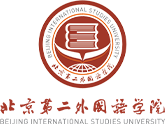
1. Overview
The School of Japanese Language, Literature and Culture was established in 1964 as the Department of Japanese Language at Beijing International Studies University (BISU). It was listed in the Ministry of Education's (MOE) roster of national and provincial first-class undergraduate schools in 2020.
The School of Japanese Language, Literature and Culture has been in the MOE's first batch of special institutions.
It has 41 teachers, including one specially-invited professor, eight professors, 17 associate professors (one full-time foreign teacher), 12 lecturers (one full-time foreign teacher), and three part-time Japanese experts.
Some of the outstanding alumni of the School of Japanese Language, Literature and Culture include professors and scholars, state councilors, ministers and ambassadors.
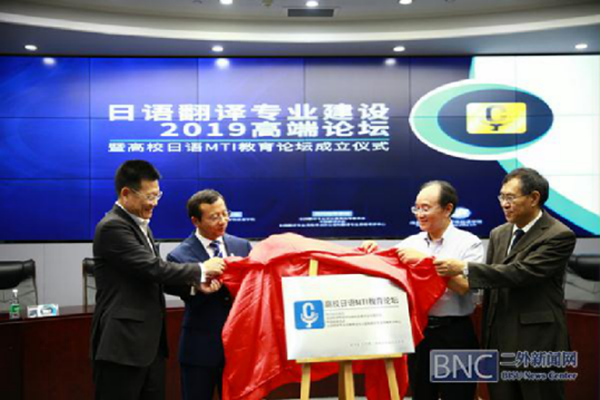
A forum for MTI education for Japanese studies in universities is launched at Beijing International Studies University on June 14, 2019. [Photo provided by bisu.edu.cn]
2. Highlights of Talent Cultivation
The school has made it a mission to support national diplomatic strategies and the building of Beijing into national center for politics, culture, international exchanges and scientific and technical innovation. It seeks to foster versatile talents of Japanese studies with an international perspective, cultivate translation & interpreting talents from undergraduate programs to doctoral programs, and nurture graduate students in academic research and vocational competence.
The school has attracted widespread attention for its academic orientation toward people-to-people exchanges between China and Japan. It has also earned ever-growing attention and recognition at home and abroad for its positive contributions to the development of China-Japan relations.
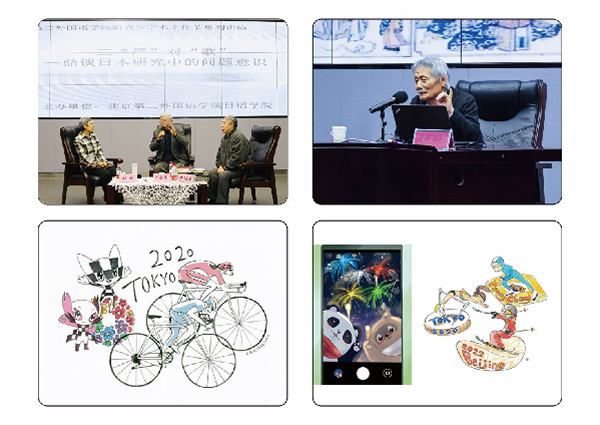
Photo on the upper left shows that at the invitation of the School of Japanese Language, Literature and Culture, Yan Ansheng (C), former director of the BISU Center for Japanese Studies; Yan Shaodang (R), former head of the Institute of Comparative Literature and Comparative Culture at Peking University; and Sun Ge (L), a specially-invited professor at the BISU, hold discussions on Japanese studies on Dec 12, 2019. Photo on the upper right shows that Sadao Tsukioka, a famous Japanese expert in comics and animation, gives a lecture at the BISU on Nov 1, 2019. Photos at the bottom show cultural creative products of animation and comics drawn by students. [Photo provided by bisu.edu.cn]
3. International Exchanges
During the past decades, the School of Japanese Language, Literature and Culture has conducted academic exchanges and cooperation with over 30 Japanese universities such as Nagoya University, Osaka University and Waseda University. Almost all of the students have been provided with opportunities to continue their academic studies abroad. Figures show that over half of students have gone abroad to pursue their studies and that over 50 percent of them are funded by government-paid scholarships.
Typical overseas study programs include an undergraduate program for students to study at the school in the first two years, go to a partner university abroad for another two years, and simultaneously earn a bachelor's degree from two universities; a seven-year educational program for bachelor's and master's degrees; a program for graduate students to study at the school of in the first year, then go abroad for the rest two years. Then, the student will receive master's degrees from two universities simultaneously oriented for vocational competence; a similar program for graduate students in the pursuit of a master's degree oriented toward academic research; a joint program for master's and doctoral degrees; and entrance examinations for a doctoral program.
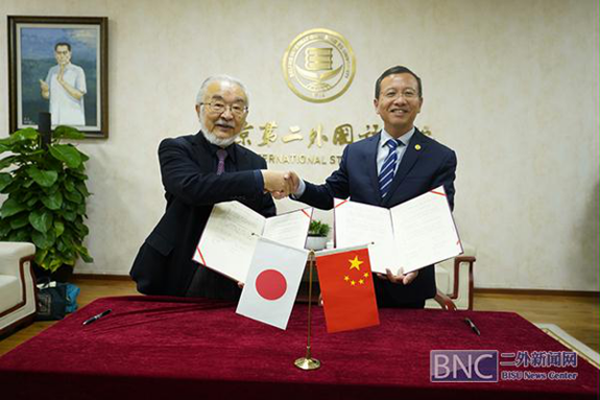
Ji Jinbiao (R), president of Beijing International Studies University, shakes hands with Oike Kazuo, president of Kyoto University of the Arts, after they sign a cooperative agreement on behalf of two universities in Beijing on Dec 4, 2019. [Photo provided by bisu.edu.cn]
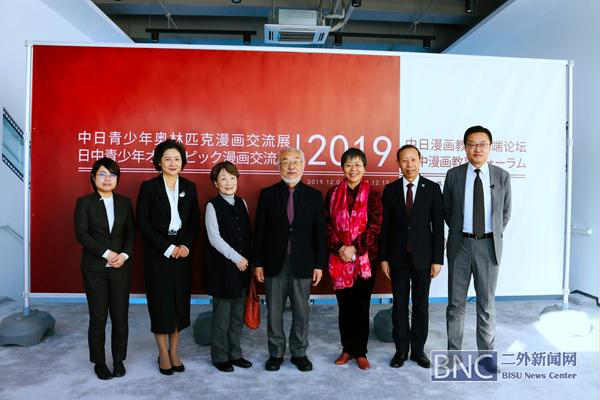
Several participants pose for a group photo on the sidelines of the China-Japan Youth Olympic Comics Exchanges Exhibition and the 2019 China-Japan Summit for Comics Education at Beijing International Studies University on Dec 5, 2019. [Photo provided by bisu.edu.cn]
4. Academics
(1) Japanese studies (people-to-people exchanges between China and Japan)
The academic program focuses on cultivating talents in the fields of Japanese language and literature and adheres to fostering international talents with sufficient knowledge of international politics, economics and culture. It seeks to also strengthen their understanding of humanistic and academic literacy, global vision and cross-cultural apprehension as well as communication in a move to help students abilities and skills in handling international affairs, business and people-to-people exchanges.
(2) Japanese studies (Chinese-Japanese simultaneous interpreting)
The academic program, which was founded in 2005, aims to conduct professional training of outstanding students who have shown excellent capabilities in Chinese and Japanese languages, logical thinking, information analysis and cross-cultural communication. They must be enthusiastic about interpreting and translating in foreign affairs and diplomacy.
It is also designed to nurture students to enable them to be qualified for interpreting and translation tasks in global firms, and transform them into high-level interpreting and translation talents.
(3) Japanese studies (cultural creative products in animation and comics)
It is an academic program established in 2019 with the "3+1" China-Japan collaborative talent cultivation mechanism as one of the principal highlights. Apart from fostering basic linguistic competence of students, it is also designed to improve their humanistic and artistic literacy, and transform them into talents who will exhibit competence in cultural creation and planning, creative writing and comics, and basic comic research. Outstanding students can take part in exchange programs in partner universities of Japan and opt to earn their master's and doctoral degrees during their overseas study.
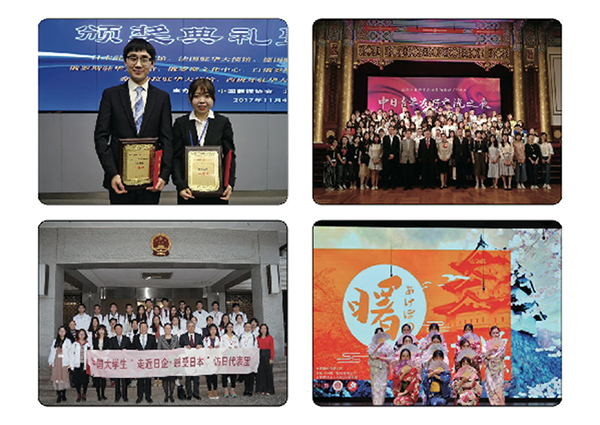
Photo on the upper left shows that Zhang Fan and Li Shumei from the School of Japanese Language, Literature and Culture win the first prize in the 10th Yongwang Cup National Interpreting Competition in the categories of simultaneous interpreting and consecutive interpreting in Beijing on Nov 4, 2017. Photo on the upper right shows students from the school taking part in a people-to-people exchange activity among Chinese and Japanese youths held by the Chinese People's Association for Friendship with Foreign Countries. Photo on the bottom left shows a group photo of students from the school during their visit to Japan. Photo on the bottom right shows performers from the school at the 38th Play Performance Festival on May 28, 2019. [Photo provided by bisu.edu.cn]
5. Employment
About half of graduates from the School of Japanese Language, Literature and Culture have entered prestigious universities like the University of Tokyo and Tsinghua University for further education. They are also qualified as interpreters and have other skills that may be needed in foreign affairs, science & technology and cultural creation.
Many graduates have found jobs in central authorities (the Ministry of Foreign Affairs, the Ministry of Commerce, the Ministry of State Security and the General Administration of Customs), universities, financial institutions, media organizations, publishing houses, and Japanese firms.
Statistics show that their employment rate has remained at 100 percent over the past three years.

Links
